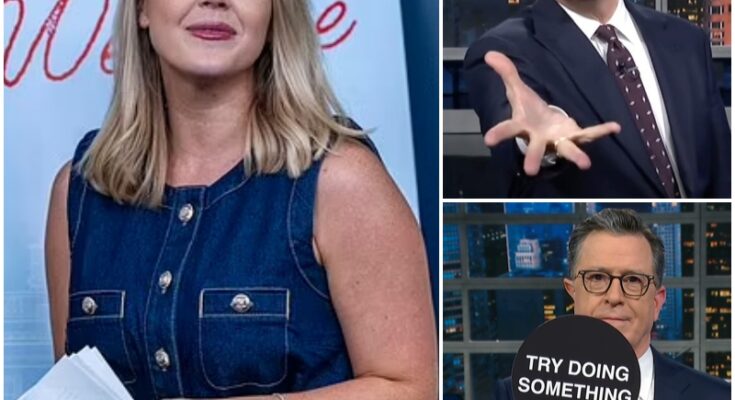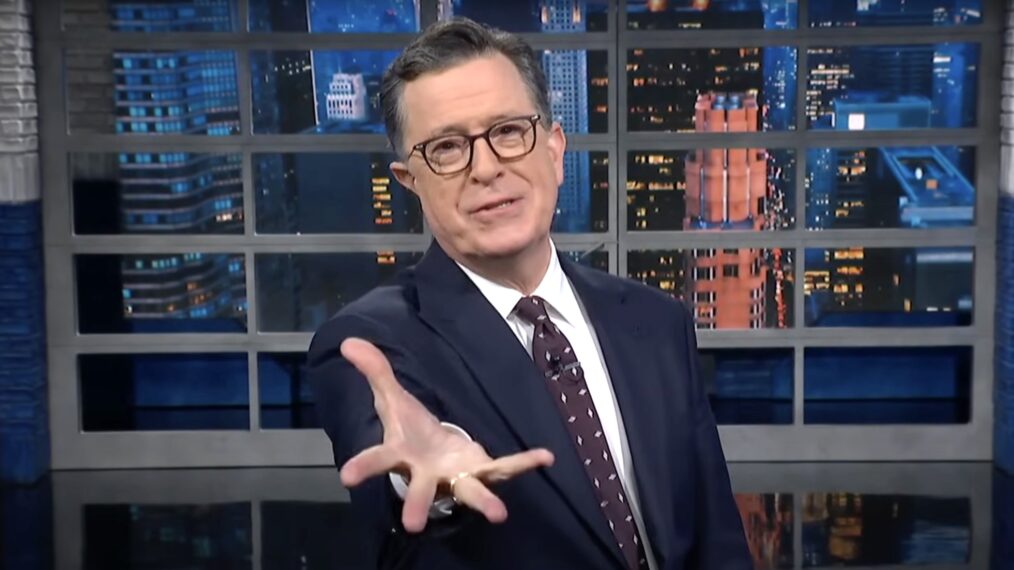The Ed Sullivan Theater has seen its share of iconic moments, but nothing quite like the night Karoline Leavitt squared off with Stephen Colbert. What began as a routine late-night interview quickly detonated into a full-blown culture war—one that left the audience reeling and social media ablaze.
An Unscripted Collision
From the moment Leavitt strode onto the stage, it was clear she wasn’t there to play the usual late-night game. Colbert, a veteran of political satire with a razor-sharp tongue and a reliably left-leaning crowd, was ready with his trademark jabs. But Leavitt, the youngest White House press secretary in history, came armed with something else: defiance.
Colbert’s opening volley—a light joke about Leavitt’s campaign style—landed with the audience, but Leavitt didn’t flinch. Instead, she fired back:
“If you want comedy, Steven, go ahead. But I came here to talk about real issues that matter to Americans.”
The laughter evaporated. The room tensed. For the first time in recent memory, Colbert’s home turf felt less like a playground and more like a battleground.
No Laugh Track for This
Colbert tried to steer things back to familiar territory—satire, pop culture, the usual banter—but Leavitt doubled down. She slammed the media’s bias, accused The Late Show of silencing conservatives, and called out what she described as a “liberal echo chamber.” The audience, used to being in on the joke, was suddenly unsure whether to clap or cringe.
Then came the Trump moment. Colbert, with a wink, tried to lampoon the former president. Leavitt didn’t budge:
“You can mock him all you want, but millions of Americans saw their lives improve under his leadership. You laughed, but they’re still struggling today.”
A Battle for Control
Colbert, momentarily thrown, tried to shift gears. Leavitt steered right back to the issues: inflation, crime, border security.
“People aren’t laughing at their grocery bills,” she shot back. “They’re not entertained by fentanyl in their schools.”
The audience reaction was electric—some boos, some gasps, but mostly stunned silence. The energy was palpable. This wasn’t just an awkward interview. It was a live, televised struggle for narrative control.
Colbert, searching for a lifeline, asked:
“Do you really believe everything you’re saying, or is this just political theater?”
Leavitt didn’t blink:
“It’s not theater when you’re living paycheck to paycheck, Steven. But maybe you wouldn’t understand that from inside this Manhattan studio.”
The crowd murmured. Offstage, producers scrambled. Colbert’s control of the room—usually absolute—had slipped.
Cut to Commercial—But the Drama Was Just Beginning
Suddenly, a producer appeared onstage, whispered in Colbert’s ear, and the segment was cut short. Cameras caught Leavitt rising, turning to Colbert, and delivering one final blow:
“Maybe next time, invite someone you’re actually willing to listen to.”
Twitter Meltdown: #LeavittVsColbert Trends Nationwide
Within minutes, Twitter (now X) exploded. The hashtag #LeavittVsColbert trended coast to coast. Some hailed Leavitt as a truth-teller who stormed the liberal gates. Others accused her of hijacking a comedy platform for political gain. The Late Show issued a statement blaming “time constraints.” Leavitt’s team accused CBS of censorship. Pundits, journalists, and culture warriors weighed in. Everyone had an opinion—no one could look away.
Shockwaves Across the Media Landscape
Conservative media lionized Leavitt, casting her as David facing down the Goliath of mainstream TV. She made the rounds, arguing that the media can’t handle real dissent.
Meanwhile, Colbert tried to laugh it off in a later monologue:
“Sometimes, truth walks in wearing a smile and leaves flipping the script.”
But the message was clear: the old rules of late-night, where the host always wins, might be over.
A Flashpoint for a Divided America
This wasn’t just a viral moment. It was a symptom—and a symbol—of a country split down the middle. For Leavitt’s supporters, it was a long-overdue reckoning with elite media. For Colbert’s fans, it was an invasion of a sacred space for satire and civility. For everyone else, it was proof that the lines between news, comedy, and political theater are more blurred—and more explosive—than ever.
The Takeaway: No More Safe Spaces
In the end, nobody walked away unscathed. Leavitt emerged as a conservative firebrand, ready to take on any stage. Colbert was reminded that even the funhouse mirror of late-night can crack when reality barges in.
One stage. Two Americas. No script. And a nation still arguing over what it all means.





